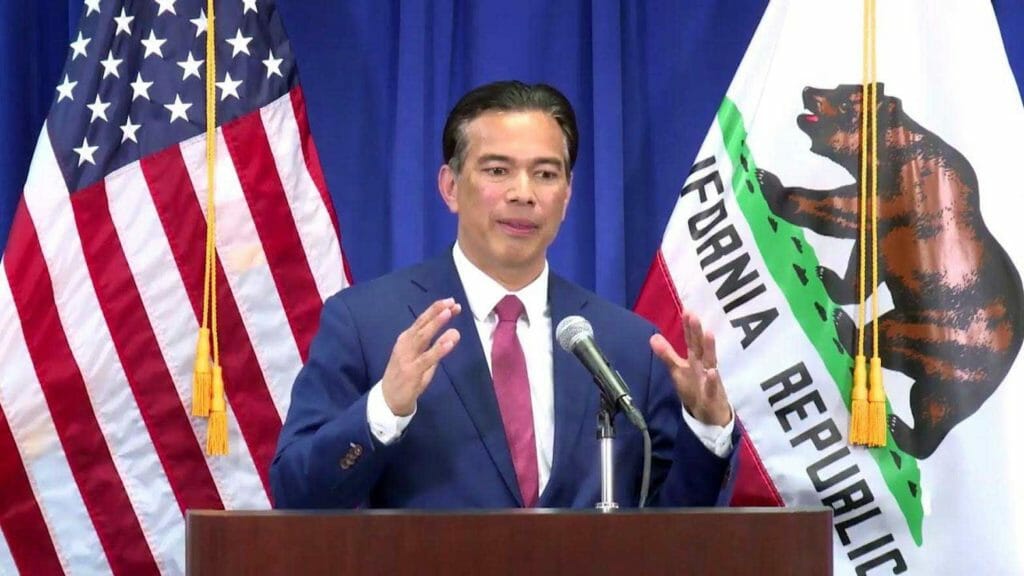California AG sounds alert on Covid testing fake sites and scams

California Attorney General Rob Bonta warns of fake testing sites and websites as more people want to be tested for Covid-19. CA.GOV
California Attorney General Rob Bonta issued an alert against scammers and fake Covid-19 testing locations and websites amid increased demand due to the spike in Omicron variant cases.
“Throughout California, fake testing sites are sprouting up to exploit families and individuals seeking COVID tests. It is important to recognize the signs of sham testing sites to protect both your money and personal information,” alerted Bonta.
“I urge Californians to do their part to avoid fake testing sites by utilizing state resources, including the California Department of Public Health’s website, to find a verified Covid-19 testing site.”
These unverified sites pose as legitimate companies and health care clinics offering Covid-19 testing but usually fail to provide their patients test results after receiving payment. These sites may also ask for a patient’s personal information with the intention of committing fraud.
Fresh reports from the Federal Trade Commission (FTC) state that about one fourth of all fraud losses reported to the commission stem from scams that consumers said originated on social media
According to the FTC’s latest Consumer Protection Data Spotlight, consumers in 2021 reported losing about $770 million to fraud initiated on social media—about one fourth of all reported fraud losses for the year and an 18-fold increase from 2017.
Of those who reported losing money to fraud in 2021, more than 95,000 indicated that they were first contacted on social media—more than twice the 2020 number. Investment scams topped the list of total reported dollar losses, followed by romance scams.
To learn more about how to spot, avoid, and report scams—and how to recover money if you have paid a scammer—visit ftc.gov/scams. If you spot a scam, report it to the FTC at ReportFraud.ftc.gov.
In his alert, Attorney General Bonta shared tips on how to avoid testing site scams, as well as how to search and locate legitimate, verified testing sites as he urged everyone to observe the following:
- Only get tested at verified COVID-19 testing sites or through medical groups. To find a verified testing site near you use the California Department of Public Health’s test site search tool.
You may also search for local testing sites through your county’s local public health department. You can find your county’s public health department website at COVID19.CA.GOV’s Hotlines and Local Info web page. Also check with local medical groups to see if they offer testing services within their facility.
- Should you choose to use an unaffiliated testing site, be wary if a provider insists on: documenting your nationality or immigration status; does not offer a notice of privacy practices, or cannot explain how it will use and share your personal data; insists on accessing your passport or driver’s license when you have other documents that show your insurance status.
- Identify and avoid “lookalike” websites:Fake testing sites may require you to sign up online. Beware of fake websites that purposely look identical to those belonging to well-known, trusted organizations and state agencies. Before entering personal information into an online form, always make sure that the website you are visiting is secure and does not display misspellings or unfamiliar names in the URL.
- Be cautious of unsolicited calls regarding testing sites: A legitimate company or health clinic will not call, text, or email you withoutyour permission. If you receive an unsolicited message from an individual, do not provide the caller or sender with any personal information until you have confirmed it is coming from a legitimate source. If you feel pressured to provide personal information, just hang up.
Victims of fake Covid-19 testing site scams are encouraged to report it to your local police or sheriff’s office and file a complaint with the Attorney General’s Office online at oag.ca.gov/report.
Bonta also reminded that the federal government launched a new federal resource where individuals can get free FDA-authorized at-home COVID-19 test kits by visiting COVIDtests.gov, or calling 1-800-232-0233 (TTY 1-888-720-7489) to order free COVID test kits from the federal government.
When placing an order online, you will be redirected to the United States Post Office website to fill out an order form that only requires you to provide your first and last name, shipping address, and an optional email.
Bonta also cautioned that no one from the federal government will call, text, or email you to ask for additional information to help you with your order.
If someone reaches out asking for additional information such as your credit card information or Social Security number, do not respond – it is a scam.

